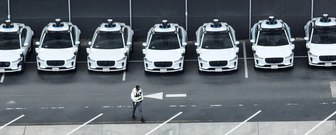At the turn of the 20th century, widespread car ownership forever changed how Americans travel. And at the turn of the 21st century, the advent of the smartphone forever changed how we communicate.
Those two monumental leaps in technology are today merging faster than ever, and continuously collected consumer data reveals which smartphone operating system dominates among American drivers of various vehicle brands.
Generally speaking, drivers of higher-end vehicle brands in the United States tend to be iPhone users. YouGov data shows most Acura, Audi and BMW owners have iPhones, as do owners of Mercedes, Lexus, and Volvo.
High consumer crossover between iPhone and BMW is no surprise, as Apple and the German automaker have been working together on tighter-knit smartphone-vehicle integration in recent years. Apple’s “iPod Out,” the initial feature on which Apple’s CarPlay would eventually be based, was first developed with BMW.
On the other end of the mobile OS spectrum, a clear majority of owners of FCA Group of brands (Chrysler, Dodge, and RAM) are Android users, as are most General Motors drivers (which includes Chevrolet, GMC, Buick).
It’s worth noting that 43% of Americans own one car, either themselves or jointly, so it’s quite possible both an Android user and an iPhone user share a vehicle. YouGov data shows women are slightly more likely to be iOS users, while men are more likely to be Android users.
Right now, the iOS/Android’s Battle of The Car has been primarily focused on infotainment integration, by way of Apple’s CarPlay and Google’s Android Auto. But we are quickly entering an era in which personal devices and personal transportation vehicles will be fully connected. Smartphones are replacing the car key. They can control a car’s climate. They can offer important vehicle diagnostic information, such as battery level or oil life. As manufactures seek deeper integration, this type of market information is valuable for prioritizing and targeting such development.
Even beyond these advancements, it appears these tech companies may be partnering with vehicle manufactures to push the electrification and automation of personal transport. For instance, it’s been reported that Apple is in talks with Hyundai and Kia to produce a self-driving car. Knowing what smartphones current drivers have in their pocket could help inform more of these partnerships.
However, as cars inch closer to being tech products, the future of the auto industry could see these partners become competitors. Tesla, for instance, is classified as a tech company rather than an automaker.
Methodology: Results based on continuously collected data from YouGov’s Profiles tool. Results are based on interviews conducted between January 2020 and January 2021. Sample sizes are between 102 and 2,657 American vehicle owners, depending on brand.
Image: Getty











